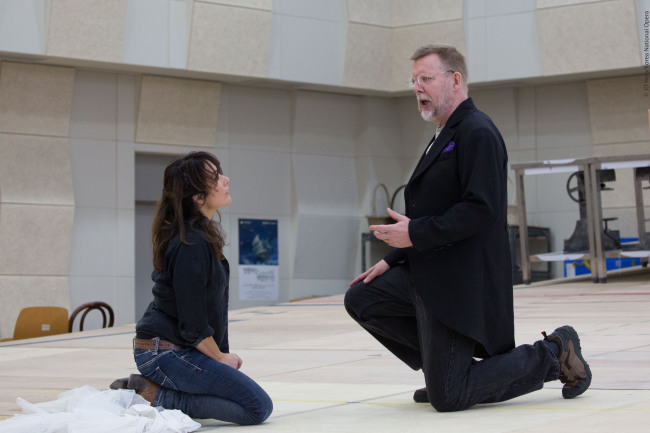Richard Wagner’s “The Flying Dutchman” is not the typical operatic tale of love and remorse.
Inspired by his own autobiography “Mein Leben,” Wagner adapted his 1839 stormy sail from Riga to London into a story of desperation, salvation and redemption through love.
 |
| Finland native Jukka Rasilainen practices his upcoming role of the Dutchman in the Korea National Opera’s new production “The Flying Dutchman.” (Korea National Opera) |
“The Flying Dutchman” is a three-act German opera that follows the tale of the Flying Dutchman ― the ghost of a cursed man who is granted release every seven years to search for a wife whose love is pure so he can be freed from his curse.
Gearing up to reprise his role of the Dutchman in the Korea National Opera’s upcoming production later this month is Finland-native bass-baritone Jukka Rasilainen. In his Korean debut performance, Rasilainen will present audiences with a role that has been in his operatic arsenal for more than two decades.
“I performed the opera for the first time in 1991 in Germany, and since then, I don’t know how many performances I’ve done, maybe 150,” Rasilainen told The Korea Herald.
“At first it took me a year to learn the part. … I was not a Wagner singer,” he added. “Musically, you have to have a tougher voice. With other operas you would feel like you’re running 100 meters or a mile, but now (with Wagner), you’re running a marathon. You need very different muscles, both vocally and mentally.”
And a marathon opera it will be. Just as in Wagner’s original production, the KNO’s nearly three-hour-long opera will not include intermissions.
“Not having any intermissions is a challenge, but it is also a good thing because it does not break the flow of the opera.”
Having played the role so many times in the past, Rasilainen says his is not relying on his past history with his latest reprisal. Rather, he is looking to approach this opera with fresh eyes.
“My profession is to forget ― when I’m done with one production, I put it in a folder and hide it,” he says. “I don’t want to be seen as the old man who says, ‘Well, back in my day, we did things this way.’”
Whether one considers themselves an opera aficionado or a complete novice, Rasilainen claims “The Flying Dutchman” is one of the best operas for a broad audience because of its dynamic storyline that is easy to follow, whether the audience understands the words or not.
Despite its premise of a cursed man searching for true love, the opera singer says people should not jump to conclusions about the tale being the story of a “bad guy” and a “good girl.”
“The Dutchman in a way has done something very wrong … nobody knows how many ladies he has been with in the past. But I don’t think that’s important. I think it’s the soul of a person so I don’t think he’s bad,” says Rasilainen.
“Besides, girls don’t like nice boys,” he said with a chuckle. “And in this opera, you never know until the end if the relationship is going to work.”
The upcoming production will also feature soprano Manuele Uhl as Senta, bass Youn Kwang-chul as Daland and tenor Kim Suk-chul as Erik. British stage director Stephen Lawless, who previously worked with the KNO in 2012 on the operetta “Die Fledermaus” and in 2014 on “Otello,” will take the helm, while music will be conducted by Ralf Weikert.
“The Flying Dutchman” will be held at the Seoul Arts Center’s Opera Theater on Nov. 19, 20 and 22. Ticket prices range from 10,000 won to 150,000 won. For more information, visit www.nationalopera.org.
By Julie Jackson (juliejackson@heraldcorp.com)



